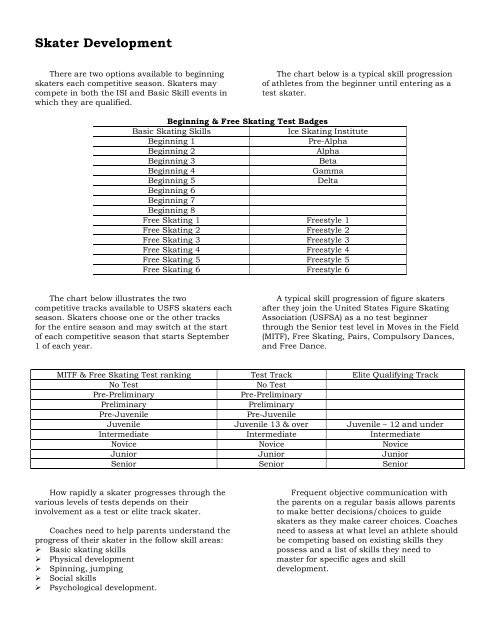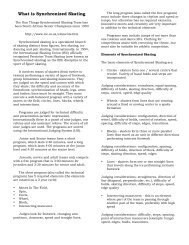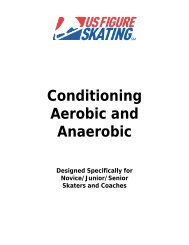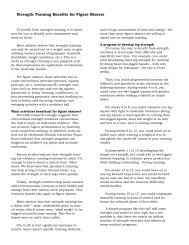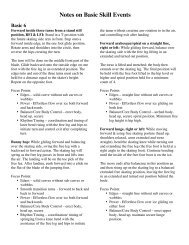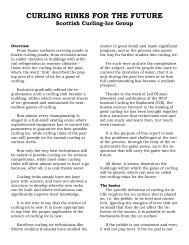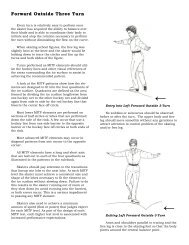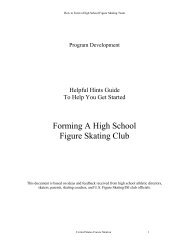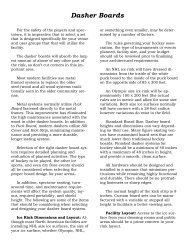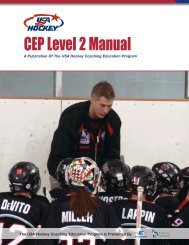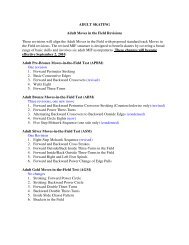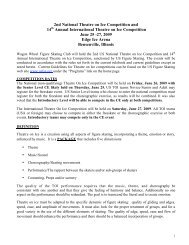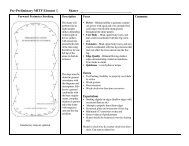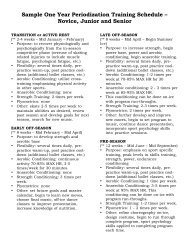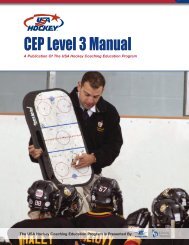Skater Development - Ice skating resources
Skater Development - Ice skating resources
Skater Development - Ice skating resources
You also want an ePaper? Increase the reach of your titles
YUMPU automatically turns print PDFs into web optimized ePapers that Google loves.
<strong>Skater</strong> <strong>Development</strong><br />
There are two options available to beginning<br />
skaters each competitive season. <strong>Skater</strong>s may<br />
compete in both the ISI and Basic Skill events in<br />
which they are qualified.<br />
The chart below is a typical skill progression<br />
of athletes from the beginner until entering as a<br />
test skater.<br />
Beginning & Free Skating Test Badges<br />
Basic Skating Skills<br />
<strong>Ice</strong> Skating Institute<br />
Beginning 1<br />
Pre-Alpha<br />
Beginning 2<br />
Alpha<br />
Beginning 3<br />
Beta<br />
Beginning 4<br />
Gamma<br />
Beginning 5<br />
Delta<br />
Beginning 6<br />
Beginning 7<br />
Beginning 8<br />
Free Skating 1 Freestyle 1<br />
Free Skating 2 Freestyle 2<br />
Free Skating 3 Freestyle 3<br />
Free Skating 4 Freestyle 4<br />
Free Skating 5 Freestyle 5<br />
Free Skating 6 Freestyle 6<br />
The chart below illustrates the two<br />
competitive tracks available to USFS skaters each<br />
season. <strong>Skater</strong>s choose one or the other tracks<br />
for the entire season and may switch at the start<br />
of each competitive season that starts September<br />
1 of each year.<br />
A typical skill progression of figure skaters<br />
after they join the United States Figure Skating<br />
Association (USFSA) as a no test beginner<br />
through the Senior test level in Moves in the Field<br />
(MITF), Free Skating, Pairs, Compulsory Dances,<br />
and Free Dance.<br />
MITF & Free Skating Test ranking Test Track Elite Qualifying Track<br />
No Test<br />
No Test<br />
Pre-Preliminary<br />
Pre-Preliminary<br />
Preliminary<br />
Preliminary<br />
Pre-Juvenile<br />
Pre-Juvenile<br />
Juvenile Juvenile 13 & over Juvenile – 12 and under<br />
Intermediate Intermediate Intermediate<br />
Novice Novice Novice<br />
Junior Junior Junior<br />
Senior Senior Senior<br />
How rapidly a skater progresses through the<br />
various levels of tests depends on their<br />
involvement as a test or elite track skater.<br />
Coaches need to help parents understand the<br />
progress of their skater in the follow skill areas:<br />
Basic <strong>skating</strong> skills<br />
Physical development<br />
Spinning, jumping<br />
Social skills<br />
Psychological development.<br />
Frequent objective communication with<br />
the parents on a regular basis allows parents<br />
to make better decisions/choices to guide<br />
skaters as they make career choices. Coaches<br />
need to assess at what level an athlete should<br />
be competing based on existing skills they<br />
possess and a list of skills they need to<br />
master for specific ages and skill<br />
development.
Personal ambitions of the skater and raw<br />
talent are not enough for a skater to reach the<br />
international competition level. A skater’s<br />
available financial <strong>resources</strong> become a major<br />
factor in the equation for success to become<br />
competitive at the National Senior level.<br />
Off-<strong>Ice</strong> Training<br />
Off-ice training is essential for all USFS<br />
members – starting at the entry-level beginner<br />
skater and continuing through to the elite athlete<br />
competing at the Olympics.<br />
Incorporating fitness training into a skater’s<br />
training program ensures that he or she is getting<br />
the appropriate level of physical activity. Young<br />
figure skaters need to recognize that off-ice<br />
training has become part of figure <strong>skating</strong><br />
training. Fitness classes should focus on fun and<br />
group participation.<br />
Training becomes more specialized as the<br />
athlete achieves higher levels of USFS tests. The<br />
following goals should included in a training<br />
program:<br />
Core Stability/Strength Training/Functional<br />
Movement<br />
Aerobic and Anaerobic Training<br />
Flexibility Training<br />
Creative musical and Dance Movement<br />
Nutrition<br />
Mental Training<br />
Developing each athlete’s yearly training plan<br />
helps skaters achieve their own level of personal<br />
excellence – as an all around recreational skater<br />
or someone who specializes as a:<br />
Free <strong>Skater</strong><br />
Pair <strong>Skater</strong><br />
Dancer<br />
Synchronized Team <strong>Skater</strong><br />
Showcase<br />
Theater on <strong>Ice</strong><br />
Basic Skating Skills<br />
Basic Skating Skills is a learn-to-skate<br />
program sponsored by the USFS designed for<br />
beginners of all ages. When a skater signs up as a<br />
Basic Skating Skills member, they become part of<br />
a program that focuses on fun, participation and<br />
basic skill development.<br />
As a skater’s skill development progresses,<br />
they can earn badges that allow them to compete<br />
in an environment with other skaters who have<br />
also achieved the same level of skills. The Basic<br />
Skating Skills program helps skaters to transition<br />
to the USFS program of tests and competitions<br />
that selects competitors to represent the USA in<br />
International and Olympic Figure Skating<br />
competitions<br />
Basic Skating Skills is the premier “Learn<br />
to Skate” program of the United State Figure<br />
Skating Association. It was developed by<br />
experts to teach the fundamentals of <strong>skating</strong><br />
in a progressive and sequential manner. It is<br />
designed to transition skaters of any age into<br />
the USFS test and competitive programs.<br />
When an adult or child becomes a<br />
member of the Basic Skating Skills program,<br />
they receive the following:<br />
Badges<br />
Stickers<br />
Coloring sheets<br />
Parent information sheets<br />
Progress updates and report cards<br />
Special Basic Skating Skill events and<br />
club functions<br />
Opportunity to participate in a positive<br />
activity<br />
The Basic Skating Skills program focuses<br />
on the development of eight fundamental<br />
goals The skills are arranged in a series<br />
progressions, from very simple to the more<br />
complex. Each stage has a primary focus.<br />
Once the skills of each stage are mastered, a<br />
skater may test for that badge. The series of<br />
badges range from Beginner 1 through<br />
Beginner 8.<br />
The goals of the Basic Skating Skills<br />
program are:<br />
Stage 1 – Balance/stroking Forward and<br />
Backwards<br />
Stage 2 – Glide Forward and Backwards<br />
Stage 3 – Stopping (Forward and<br />
Backwards, one foot and two foot)<br />
Stage 4 – Edges (Forward and Backwards,<br />
Outside and Inside)<br />
Stage 5 – Crossovers (Forward and<br />
Backwards)<br />
Stage 6 – Speed/Power Forward and<br />
Backwards<br />
Stage 7 – One foot turns (3-Turns)<br />
Forward and Backwards<br />
Stage 8 – Change foot turns (Mohawks)<br />
Forward and Backwards<br />
The test structure of Moves in the Field<br />
(MITF) is an instructional program that<br />
focuses on balance, power, agility, speeds and<br />
endurance. Each test level stresses technical<br />
skills, technical performance levels, and<br />
conditioning/stamina.
The unique skill requirements of the MITF<br />
tests helps a skater prepare for becoming a well<br />
balanced skater. Mastering the MITF<br />
requirements helps to motivate skaters to<br />
continue to achieve the skills required to pass<br />
their free <strong>skating</strong> tests.<br />
<strong>Skater</strong>s six or older progress through a series<br />
of basic skills:<br />
• Forward and backward <strong>skating</strong> skills (<strong>skating</strong><br />
the length of the rink using alternate strides<br />
• Stop on command without use of the boards.<br />
• Balance skills, forward and backward <strong>skating</strong><br />
• Turning agility skills.<br />
The United State Figure Skating Association<br />
provides the following opportunities:<br />
• Recognized through a nationally standardized<br />
testing system of figure <strong>skating</strong> skills<br />
• Open and interclub non-qualifying<br />
competitions<br />
• Sanctioned club shows and carnivals<br />
• Testing and qualifying competitions leading to<br />
National Championships<br />
• <strong>Development</strong> of skills such as goal setting,<br />
self-discipline, self-confidence, time<br />
management, healthy & drug free lifestyle,<br />
and coping strategies to deal with success<br />
and failure.<br />
The Basic Skating Skills program consists of<br />
five specialized areas –<br />
Skating Skills<br />
Free Skating<br />
<strong>Ice</strong> Dance<br />
Interpretive<br />
Synchronized Team Skating.<br />
Each area is divided into different levels of<br />
skill development that qualify for national<br />
competiton.<br />
Taking tests are not mandatory, but most<br />
USFS skater use the opportunity to test at<br />
organized test sessions as a way of measuring<br />
their skills. <strong>Skater</strong>s may choose to enter<br />
competitions in No Test Level events.<br />
<strong>Ice</strong> Dancing<br />
<strong>Ice</strong> Dancing involves a skater’s ability to<br />
perform specific edges, steps, and turns as<br />
defined in a dance pattern while performed to the<br />
correct timing/rhythm, musical interpretation,<br />
and flow, body control and unison if performed<br />
with a partner.<br />
Free Skating<br />
Free <strong>skating</strong> consists of the execution of<br />
jumps, spins, footwork, field movements and<br />
stroking, either in isolation or performed in<br />
sequence to music.<br />
Interpretive, Showcase and Theater On <strong>Ice</strong><br />
All Interpretive free <strong>skating</strong> programs are<br />
designed to encourage and develop skaters'<br />
creativity, expression, body movement,<br />
interpretation of music, and the use of space,<br />
rhythm, line, and style. These events<br />
deemphasize skater’s performing multirevolution<br />
jumps and encourage the<br />
performance aspect of <strong>skating</strong>.<br />
The trip to US Nationals starts by<br />
qualifying at Regionals, followed by<br />
Sectionals, and then on to Nationals.<br />
Life after Competing in Regionals<br />
What are my options in figure <strong>skating</strong> if I<br />
am not an elite track competitive skater<br />
There are a number of options once a skater<br />
decides that the elite competitive track may<br />
not be the program for them.<br />
<strong>Skater</strong>s may choose to enter the Test<br />
Track Competitive Program or participate on a<br />
Synchronized Team Skating team. Contact:<br />
Susi Wehrli-McLaughlin<br />
Senior Director of Membership<br />
swehrli@usfigure<strong>skating</strong>.org<br />
http://www.usfigure<strong>skating</strong>.org/Programs.<br />
aspid=79<br />
Some skaters who leave the Competitive<br />
Program may wish to pursue becoming a<br />
coach, judge or accountant. Others skaters<br />
may choose to compete as an adult member<br />
of the USFS.<br />
Annual competitions for high school<br />
skaters are currently being held in certain<br />
areas of the USA. If you are interested in more<br />
information about organizing or participating<br />
in a high school event in your area, please<br />
contact,<br />
Ian Macadam,<br />
USFS National Vice Chair, School Programs<br />
iceskater@beld.net.<br />
There is a Collegiate Skating program,<br />
which allows skaters attending college to<br />
participate in events such as singles, dance,<br />
pairs, and synchronized <strong>skating</strong>. Visit<br />
http://www.usfigure<strong>skating</strong>.org/Programs.as<br />
pid=45 or contact<br />
Kelly Hodge<br />
Director of Synchronized Skating and<br />
Collegiate Programs<br />
khodge@usfigure<strong>skating</strong>.org


